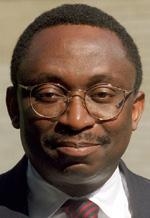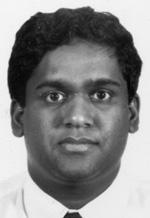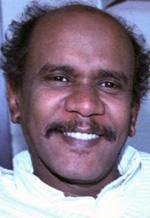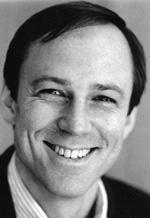Below are the nine faculty members from the School of Engineering whose promotion to the rank of full professor was approved by the Executive Committee of the MIT Corporation. Descriptions of those from the other three schools with promoted faculty (architecture and planning; humanities, arts and social sciences; and science) were published in the May 7 issue of MIT Tech Talk. All appointments are effective July 1 unless otherwise noted.
Akintunde Ibitayo (Tayo) Akinwande
Electrical Engineering and Computer Science
Education: B.Sc. 1978 (University of Ife, Nigeria), M.S. 1981, Ph.D. 1986 (both from Stanford)
Joined MIT faculty: 1995
Tenured: 2000
Akinwande does research on electronic devices and microfabrication for flexible and conformable large-area electronics. His work focuses on display devices and vacuum microelectronics with the aim of building flat-panel displays that are smarter, lighter, brighter, more energy-efficient and more integrated with computing and communications.
Duane S. Boning
Electrical Engineering and Computer Science
Education: Two S.B.s in 1984, S.M. 1986, Ph.D. 1991 (all from MIT)
Joined MIT faculty: 1992
Tenured: 2000
Boning is interested in improving the science, technology and practice of semiconductor manufacturing, including silicon microelectronics, microelectromechanical systems and optoelectronics. He has successfully applied statistical modeling and optimization to issues such as uniformity, manufacturability and yield. He focuses on chemical-mechanical polishing, alternative interconnect technologies and semiconductor process control.
W. Craig Carter
Materials Science and Engineering
Education: B.S. 1983, M.S. 1987, Ph.D. 1989 (all from the University of California at Berkeley)
Joined MIT faculty: 1998
Tenured: 1998
Carter's research incorporates many computational and theoretical aspects of materials science and engineering. He is best known for his work on computation of materials properties from mesoscale structures, microstructural evolution of surfaces and interfaces, and ceramics processing. Carter and his collaborators produce public domain software for visualization and pedagogy of materials science topics.
Anantha P. Chandraksan
Electrical Engineering and Computer Science
Education: B.S. 1989, M.S. 1990, Ph.D. 1994 (all from the University of California at Berkeley)
Joined MIT faculty: 1994
Tenured: 2000
Chandrakasan has focused his research on digital integrated circuits and systems. He has developed design methodologies for energy-efficient computing and communication including dynamic voltage scaling and energy harvesting techniques. He has started projects on distributed wireless microsensor networks, ultra-wideband radios, and interconnect centric design.
Peter C. Dedon
Biological Engineering
Education: B.A. 1979 (St. Olaf College), M.D. and Ph.D. 1987 (University of Rochester)
Joined MIT faculty: 1991
Tenured: 1998
Dedon's research group has made advances in understanding the chemistry and biology of DNA damage produced by drugs, environmental agents and toxins produced by human cells. His recent collaborations with nuclear and mechanical engineers at MIT have led to the development of novel devices and approaches to studying biologically important problems of DNA damage, repair and structure.
Elfatih A.B. Eltahir
Civil and Environmental Engineering
Education: B.Sc. 1985 (University of Khartoum), M.Sc. 1988 (National University of Ireland), S.M. and Sc.D. 1993 (both from MIT)
Joined MIT faculty: 1994
Tenured: 2000
Eltahir studies the physical processes that drive the Earth's hydrologic cycle, focusing on the effects of large-scale land use change such as deforestation on regional and global climate. His research has paved the way for improved accuracy of regional models used to analyze and predict climate change.
Gregory C. Rutledge
Chemical Engineering
Education: S.B. 1983 (University of Virginia), Ph.D. 1990 (MIT)
Joined MIT faculty: 1991
Tenured: 1998
Rutledge, who is director of MIT's Program in Polymer Science and Technology, aims to develop quantitative relationships between chemical architecture and materials properties on polymers and other complex molecular systems. His breakthroughs include a definitive theoretical resolution of a 30-year-old problem concerning the nature of folding at the crystal/amorphous interface in polyethylene.
Ram Sasisekharan
Biological Engineering
Education: B.S. 1985 (Bangalore University), M.A. 1987 (Harvard University), Ph.D. 1992 (Harvard Medical School)
Joined MIT faculty: 1996
Tenured: 2000
Sasisekharan is a leader in the emerging field of glycomics, or the study of sugars. He has developed a practical method for sequencing polysaccharides and is applying this and other methods to developing novel low molecular weight heparins. His technology also has applications in anticancer drugs and in studies of regulating protein function.
Madhu Sudan
Electrical Engineering and Computer Science
Education: B.Tech. 1987 (Indian Institute of Technology), Ph.D. 1992 (University of California at Berkeley)
Joined MIT faculty: 1997
Tenured: 2000
(Promotion effective Jan. 1, 2003)
Sudan has made major contributions to theoretical computer science. His research interests include computational complexity theory, algorithms and coding theory. He is best known for his works on probabilistic checking of proofs and on the design of list-decoding algorithms for error-correcting codes. He received the Rolf Nevanlinna Prize in 2002.
A version of this article appeared in MIT Tech Talk on May 14, 2003.













